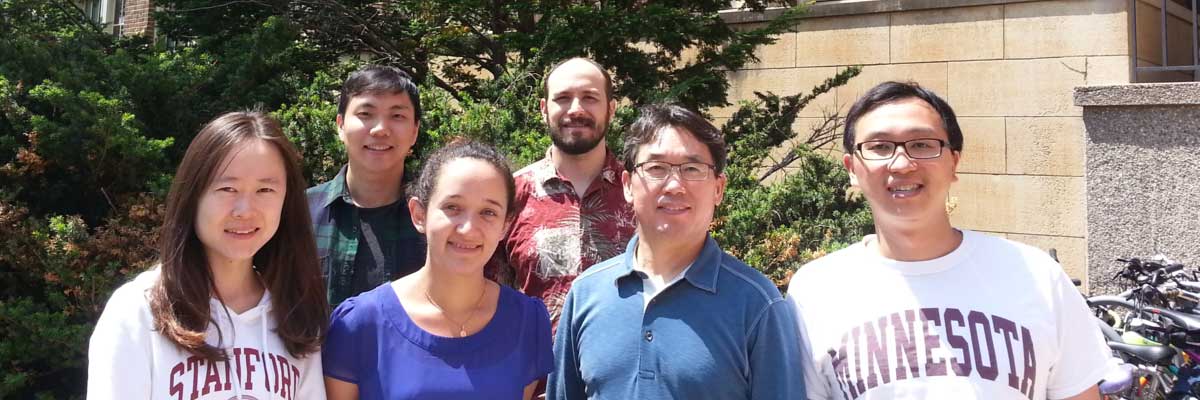
Capitalizing on the True Power of Enzymes
Ping Wang has an educational background in biochemical engineering and a research focus on nanotechnology and enzyme engineering. Benefiting from the latest advances in enzymology, nanoscale science and materials technology, he explores powerful biocatalysts for biomanufacturing and bioenergy.
Conceiving and realizing nature-inspired multienzyme reaction pathways in vitro for important biotransformations is one major thrust in his research. That involves the discovery and activation of enzymes to drive desired transformations under intensified engineering environments for production of value-added chemicals, fuels and materials from renewable materials.
Functional and smart biomaterials and coatings are another important area in Wang's research, especially surface functionalities and activities realized by using enzymes and proteins. A recent research in Wang’s lab demonstrated the development of thin plastic films containing active enzymes with potential applications such as self-cleaning and antimicrobial materials.
Other research activities in Wang's lab cover a wide range of enzyme engineering and nanobiotechnology, including studies on enzyme activation, stabilization and functionalization via both protein engineering and nanotechnology; development of cell-free biosynthesis pathways, carbon capture and artificial photosynthesis, bioremediation, biosensors and targeted enzyme-activated drug delivery systems; as well as bioenergy technologies using bio-based nanostructured carbon electrodes for energy storage, and biofuel cells for direct power generation from biochemical and biomass.
Selected Representative Publications:
G. Dai, J. Hu, X. Zhao, Ping Wang*. A Clorimetric paper sensor for lactate assay using a cellulose-Binding recombinant enzyme. Sensors and Acuators: B Chemical. 238: 138-144, 2017.
Rehman, Saima; Wang, P.; Bhatti, HN; Bilal, M.; Asgher, M.. Improved catalytic properties of Penicillium notatum lipase immobilized in nanoscale silicone polymeric films. Intern. J. Biological Macromolecules 97: 279-286, 2017.
Liting Zhanga, Yaofei Sun, Wenji Yao, Guoying Dai and Ping Wang. Fabrication of cotton fabrics using family III cellulose-binding domain for enhanced surface properties. RSC Adv., 6: 105202-105205, 2016.
Xiaoyuan Ji, Zhiguo Su, Ping Wang, Guanghui Ma, Songping Zhang. Integration of Artificial Photosynthesis System for Enhanced Electronic Energy-Transfer Efficacy: A Case Study for Solar-Energy Driven Bioconversion of Carbon Dioxide to Methanol. Small. 10: 4753-4762, 2016.
Xiaodan Cao, Haijun Yu,Chao Chen,Jia Wei,Ping Wang. Expression and characterization of recombinant humanized anti-HER2 single-chain antibody in Pichia pastoris for targeted cancer therapy. Biotechnol Lett. 37(1): 81-88, 2015.
Xia S, Zhao X, Frigo-Vaz B, Zheng W, Kim J, Wang, P. Cascade enzymatic reactions for efficient carbon sequestration. Bioresour Technol. 182:368-72, 2015.
S Xia, B Frigo-Vaz, X Zhao, J Kim, P Wang . Biocatalytic carbon capture via reversible reaction cycle catalyzed by isocitrate dehydrogenase. Biochemical and Biophysical Research Communications, 452: 147-150, 2014.
S Xia, P Wang, J Kim. pH sensitivity of carbon dioxide conversion catalyzed by isocitrate dehydrogenase. Greenhouse Gases: Science and Technology, 1-6, 2014.
Ping Wang, Nanoscale Engineering for SmartBiocatalysts with Fine-Tuned Propertiesand Functionalities. Topics in Catalysis. 55: 1107-1113, 2012